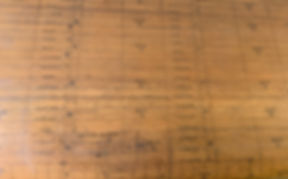In contrast from today, laundry was an all-day affair in the late 1800’s and, generally, it was literally in the hands of children to endure as they scraped dirtied cloths along wooden boards plunged in tubs full of soapy water.
Delaware County Historical Society owns examples of this equipment from wash boards to tubs to wringers and even soap boxes that illustrate how laundry was done in the 19th century.
In the collection are both a wooden and a metal washing tub, a wringer, a pair of wash boards - suitable for travel, soap boxes, several sad irons and even an ironing board.
Both wash boards come from the Columbus Washboard Co. of Columbus, Ohio. On them are promises of being “Ideal for silks, hosiery and lingerie or handkerchiefs” and “Just the right size to fit a bucket pail or lavatory.”
For those who so desire, they also pack “easily into suitcase or traveling bag,” according to the wording on the device.
While wash boards are no longer used today, a glance at the 1897 version of the Sears, Roebuck & Co. Catalogue show that their brand of wash boards ranged from 12 to 20 cents and standard 27-inch pine tubs were 80 cents each, or $8.80 for a dozen.
The DCHS wringer stands on the floor, with a hand crank ready to squeeze excess water out of the garments. In the Sears book, smaller versions ranging from $1.30 to $3.00 are featured. The wringers had clamps to stabilize them.
Sad irons were commonly used in pairs as one was placed on a stove to heat while the other was used to press wrinkles out of clothes and linens. Costing about 20 cents, they were called “sad,” as that meant “solid” or “heavy” in that day and these devices ranged from 5 to 15 lbs.
And, of course, there were soaps. Delaware County Historical Society keeps boxes of Allen’s Pure White Soap and Dr. Price’s “vegetable wonder.” As described on the boxes, Allen’s was “For Hand and Bath” and Dr. Price’s bar was “for toilet and bath.”
Although these brands weren’t offered by Sears, their laundry soap cost 4 cents a bar or anywhere from $1.50 to $3.50 for a box of 60 lbs. Toilet soap, on the other hand, was 45 cents for castile or genuine “Turkish bath,” 25 cents for “Congo Cocoa” and 23 cents for “Oat Meal.” Yankee shaving soap ran $1 for a dozen.
The wash boards, wringers, irons and soap boxes are housed at the home of Delaware County Historical Society, located at 408 Avenue of the States in Chester. It is open to the public from 10 a.m. to 4 p.m. Monday, Wednesday and Friday; 10 a.m. to 6:30 p.m. Thursday; and from 9 a.m. to 2 p.m. on the second Saturday of the month. It is closed on Tuesdays. Appointments are also available upon request. Parking is free in the lot behind the building or across the street in the city’s municipal lot.
For more information or for ways to get involved or to contribute items of historic significance, please call 610-359-0832.

Tubs and wash boards are part of Delaware County Historical Society's collection of laundering items.

Sad irons were used to press wrinkles out of clothes in the days before wrinkle-free clothing.

A box of Allen's Pure White Soap tells that it was for both hand and bath.












